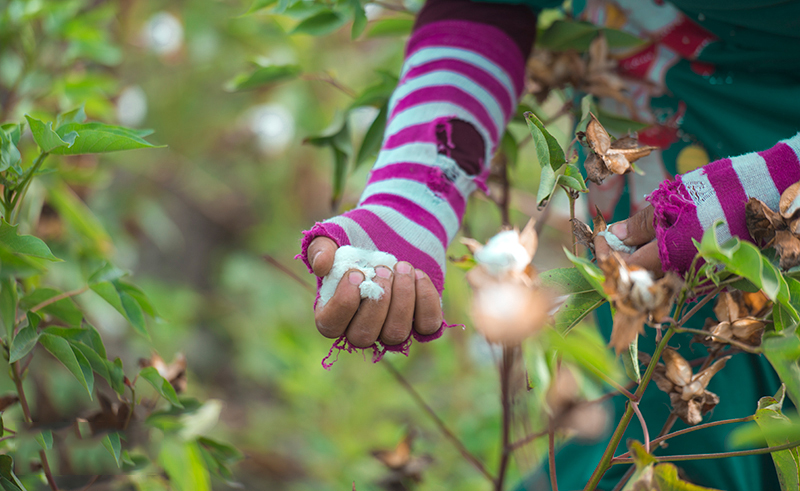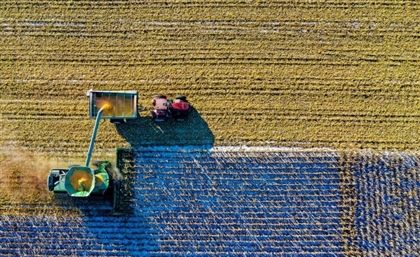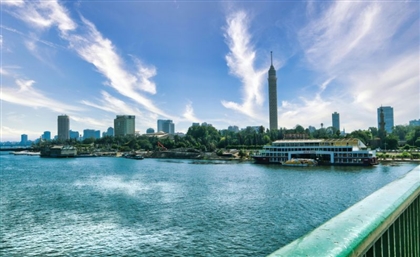3 Agritech Startups Creating a Farming Revolution in Egypt
We speak to Egyptian Agritech startups, Agrimatic, Askova, and Wastilizer using soilless farming, wind power, and biotechnology to feed the Arab world's most populous nation.

Once upon a time, several thousands of years ago, agriculture was the spine cord of Egypt’s civilisation. In fact, it was the reason why the pharaohs’ legacy lived that long, independently feeding their people with their own resources. Fast forward to more than 7,000 years, Egypt imports the majority of its food with up to 70 percent of its need for wheat – the main and most basic food component Egyptians rely on.
While the talk on agriculture and the UN’s Sustainable Development Goals (SDGs) is not new, there is an increasing interest in the entrepreneurial circles expressing their enthusiasm to get involved and turn the tables. What does that mean to the farming industry? We speak to three startups, each working in parallel in a specific field in agriculture.
1. Askova

Askova's name is derived from a Danish city, Askov, which was the birthplace of the first electricity-generating wind-turbine.
Due to Egypt’s proximity to the equator, coupled with global warming, winds blow gently. Sometimes, so gently that it doesn't guarantee sufficient energy for wind turbines to run the farm.
Egyptian startup Askova has developed a prototype of a wind turbine that would accelerate the wind speed. “We developed a special casing for wind turbines that would accelerate wind speed and concentrate it through blade areas, making the blade rotate faster in areas with low wind speed. The speed value would range from 6 metres per second to 8 metres per second,” Mohamed Fawzy tells Startup Scene. “This turbine is more economic than the traditional type for Egypt's conditions.”
Askova’s name is derived from a Danish city, Askov, which was the birthplace of the first electricity-generating wind turbine, built in it in 1891 with funds from the Danish government. With a recent EGP 1,000,000 cash prize from Hult Prize Egypt, Askova will be able to develop turbines of three sizes; 1 kilowatt, 3 kilowatts, and 5 kilowatts as final commercial prototype beside the existing current size of 0.5 kilowatt.
“We will activate our manufacturing partnerships to produce around 40 units of our turbine that can cover five agricultural farms in west Minya Governorate,” says Fawzy. “We will hire more professional employees in marketing and technical departments to can expand easily across the Egyptian market.”
After receiving the prize, the team travelled to the Ashridge Castle in the UK to transform Askova from a local startup into an international brand in the global renewable energy field. “We already sealed a deal with a small Turkish wind turbine company called istaBreeze and with another British wind turbine company called Aeolos to manufacture what we need from their wind turbines in order to make it suitable for our conditions,” he adds.
2. Wastilizer

"Our solution was to turn this slurry into a fertiliser for plants, turning waste into life."
Wastilizer, a company that uses animal waste to produce plant fertilisers, will also accompany Fawzy to Ashridge Castle as the second runner up in this year’s Hult Prize Egypt. “The castle will open the opportunity to meet our main needs in terms of business concepts like capital, mentorship, marketing, business development, customer acquisition and talent recruitment,” Ahmed Alaa, Wastilizer’s CEO and co-founder tells Startup Scene. "We will be guided by well-established corporates like Google and great experts in the entrepreneurial field who have huge experience and great advice to avoid the problems the projects could face.”
Wastilizer’s process goes as follows: First, this animal waste is fed into a bio-gas generating unit created by the startup’s partners, such as Biomix. “This unit will turn the animal waste into biogas,” Alaa explains. “The thing is this unit also produces a liquid-like material called "slurry" which the farmers don’t know how to deal with. So, our solution was to turn this slurry into a fertiliser for plants, turning waste into life.” What they basically do is placing it into a de-watering machine to remove water and increase its solid content. Then it is inserted into a granulator machine to produce the fertiliser as granules. They plan to have the machine fixed on a truck that will be passing by each farmer’s house to enter the slurry into the machines and produce the fertiliser on the spot and then will be sold to the farmer.
“Our project complies with 14 out of the 17 SDGs,” Alaa says. “However, it doesn’t contradict the remaining three.” Wastilizer increases the average income of the farmer by buying the slurry from him with a “decent” amount of money instead of dumping it in the canals and also sell him back the fertiliser at nearly half of its price. “We provide job opportunities for the workers on our machines, with decent salaries and we buy the slurry from the farmers with enough money,” he adds.
By using bio-organic fertilisers, the startup would enhance the quality of crops while building on the concept of circular economy, saving money and time to let the farmer’s children go to schools and learn. With the adoption of the circular economy, Wastillizer uses the waste from animals into producing energy then converting it into a fertiliser that feeds cattle again. "As an initial start, we need $30,000 (approximately EGP 600,000) to buy our dewatering and pelletising machines as they are not manufactured in Egypt," says Alaa. "So we will have to import them from Europe." They are nonetheless aiming to manufacture their machines in the future instead of importing them.
“We collected slurry that was usually dumped in regular water streams, so we enhanced the surface water quality,” adds Alaa. “Moreover, we protect the groundwater from percolation of slurry liquids into it.” They also enhance the quality of the crops by using bio-organic fertilisers, as they save the natural gas used heavily in the fertilisers industry - which is the largest sector that consumes natural gas in Egypt, after electricity. Nearly all the slurry is turned into fertilisers in the end, and the water generated in the dewatering process could be used for irrigation, since it’s clean enough to irrigate the crops. On the same level of environment-friendliness, Wastelizer’s product nearly burns no fuels except for the small amounts that operate the machines, in contrast with the huge carbondioxide footprint caused by the conventional fertiliser industry.
3. Agrimatic

“We are currently in the process of preparing to add another line, of supplementing machinery that both serve the soilless agriculture operations, as well as some traditional agriculture operations,” says Mostafa Hassanen, Agrimatic's CEO.
“With health and education already getting a lot of attention and action, food security - especially since Egypt is originally an agricultural country - seemed to be the more attractive domain,” Agrimatic’s CEO Mostafa Hassanen tells Startup Scene. Agrimatic works on soilless agriculture technology development, including both the system development, and the scientific know-how development in terms of plant growth.
After conducting research and several market studies, it was quite obvious to Agrimatic’s team why Egypt is falling behind in the agricultural landscape. “We are simply lagging behind in our adoption rate of technology, due to our lack of our awareness, and on another level due to the challenging economic conditions, heightened by the fact that technology is always expensive,” Agrimatic’s Business Development Manager Nouran ElSaid tells Startup Scene.
However, the average farmer and the majority of those in the agricultural industry, most of whom belong to low-income communities, have little to no education. Therefore, the concept of investing in something and assessing its return doesn’t exist in their philosophies when managing farms. Egypt has a rapidly growing population, with increasing demand on food, while water scarcity is steadily getting more alarming; especially with the Grand Ethiopian Renaissance Dam slated to become a reality in five to 15 years.
“The opportunities we have here in Egypt are numerous, be it the cheap cost of land and facilities, the low cost of raw material, and most importantly, the very cheap cost of incredibly brilliant caliber in all specialties,” says ElSaid.
The dream behind Agrimatic was to establish an entity on solid scientific grounds in an industry that is based mostly on individuals who resort to common practices and an approach of excessive use of resources to reach "better results, because the more is always better.” The startup endeavors to build an R&D hub that attracts the best minds and talents and provides the nurturing environment to create cutting-edge technology.
"We have a large, multidisciplinary team of over 60 agrimatizers," ElSaid elaborates. "Our largest team is the Technical Team that is focused on research and development, consisting of a science team, with specialists in agriculture, aquaculture, microbiology, and chemistry, who focus on the scientific know-how development through research and experimentation, and the engineering team, including mechanical, industrial, and construction engineers, who are focused on the system designs and technologies."
Following in size, is the "Agrimatic farms EG" team, led by two of Agrimatic's co-founders, Mohamed El-Naggar, the devision's General Manager, and Marwan Nabil, the Operations Governor, the company's operations arm, under which they have the farm team with long expertise in farm management and operations. The Internal Affairs Unit, covering both Community Affairs, and Financial Affairs domains, and led by Agrimatic's fourth co-ounder, Nadeem Aburabia.
The startup provides tailored systems, along with entire feasibility studies, to clients interested in adopting or investing in soilless systems, especially with the rising demand within local and regional markets. Agrimatic offers a partnership model for those interested to delve into the soilless industry, however do not own suitable properties or wish to explore the field. “We are currently in the process of preparing to add another line, of supplementing machinery that both serve the soilless agriculture operations, as well as some traditional agriculture operations,” Hassanen says.
Along with Hasanen, the business developer opted to bootstrap throughout the majority of their journey since 2015 to present day. “We depended on our own resources, along with our close circles through the initial phases of trials,” she elaborates. “The increasing need to finance the system developments, along with the experimentation phases, we developed the 'Client Partnership Framework,' where we partner up with individuals or entities to develop and operate systems, and share profits. This has proven to be very successful and rapidly grew in popularity, due to the impressive returns on such systems, especially in light of our mass-production approach and our target market.”
The agricultural landscape in Egypt, which is quite similar to agriculture in the entire region, depends on adopted practices, Hassanen observes. “Dependency on a real scientific basis is very uncommon, which is a shame and the reason behind the majority of current-day problems in agriculture,” he says. “Be it the inefficient use of agriculture, or the use of excessive pesticides and fertilisers, resulting in endless damages to the soil and the wastewater.”
Furthermore, Hassanen finds that agriculture is an industry that depends on individual consultants, not entities, and in turn lacks knowledge exchange. “If any entity is depending on such a consultant, once he is not available, the entire entity comes to a halt and fails, which leads people to depend on their wit and the practices they have observed, and again, not science,” he explains. “This is of course the practice of the majority; however you can find very large prominent entities that practice sound agricultural processes based on science, yet they remain few and more of a niche.”
Agrimatic is aware that they are not the only ones offering new technologies - they find several startups nowadays working on different aspects in agriculture. “All of us have an impact on each other and the industry, and we - agrimatizers - aim to consistently have influence,” he says. “For instance, we have decided to start an initiative called AAgriSol, which is meant to be an annual event bringing together multiple stakeholders in the industry, be it growers, consumers, investors, or researchers.”
Main photo: @MO4Network's #MO4Productions.
Photographer: Amr Medhat.






















